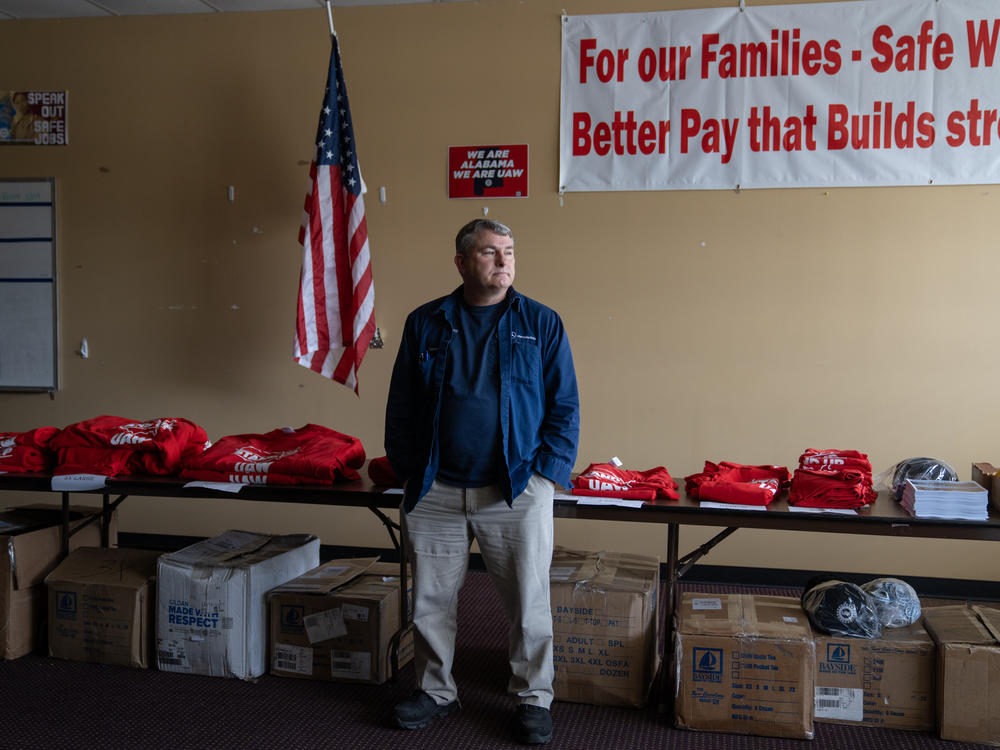Section Branding
Header Content
Want to understand America's labor movement? Head south
Primary Content
You're reading the Consider This newsletter, which unpacks one major news story each day. Subscribe here to get it delivered to your inbox, and listen to more from the Consider This podcast.
1. An apparent boom for labor unions
If you measure success in headlines, the last 12 months have been a major win for organized labor.
- There were strikes by Hollywood writers and actors where they wrested concessions from major studios.
- There was a deal for UPS workers that Teamsters general president Sean O'Brien called their most lucrative ever negotiated.
- And last fall, the United Auto Workers waged a strike against the Big 3 automakers and won big.
Union president Shawn Fain signaled that he saw new contracts with Ford, GM and Stellantis as just the beginning.
Fain pledged to go bigger – to unionize non-union plants, like Tesla and foreign-owned plants in the South.
The first test of that plan was last month with a vote to unionize a Volkswagen plant in Chattanooga, Tennessee, and it was another union victory, with 73% percent of workers voting to join the UAW.
But those splashy victories don't tell the whole story. The U.S.'s union membership rate fell to a record low of just 10% in 2023.
Organized labor still faces especially long odds in the South, with many states enforcing right to work laws, and governors who want to keep unions out.
2. A stark contrast
Six governors, including South Carolina Republican Henry McMaster recently signed a letter opposing the UAW's southern labor push.
McMaster, in his recent state of the state address, said that,
"We will not let our state's economy suffer or become collateral damage as labor unions seek to consume new jobs and conscript new dues-paying members."
It's indicative of a culture that has taken concerted efforts from workers in the south to overcome.
In Alabama, workers have been at the center of three high-profile, fiercely-fought labor campaigns over the past several years. And though they're in three different industries, they all took place in a state that has anti-union attitudes enshrined in its constitution
For the workers at the Warrior Met coal mine in Brookwood, a strike for higher wages and benefits was long, painful, and ultimately unsuccessful.
About eight years ago, after the mines went bankrupt, Wall Street investors came in to save the business.
To save their jobs, workers agreed to big cuts of their pay and benefits. They thought that would be temporary. But five years on, the miners were still waiting to be made whole. In 2021, about a thousand of them went on strike. That strike lasted nearly two years, and was ultimately called off. Workers have still yet to get movement on a contract.
Another protracted labor dispute has played out at a massive Amazon warehouse in Bessemer, where workers are waiting on a possible third round of union voting after labor officials found Amazon had illegally interfered in the first election, and the second was too close to call.
3. Looking to the future
One of those battles is currently underway, at the Mercedes-Benz plant in Tuscaloosa County. After years of stagnant wages, and a two-tiered pay system that employees were unhappy with, a UAW organizing wave has caught fire among the more than 5000 employees working in the factory.
In just a few weeks, these workers will vote on whether or not to join the UAW. Mercedes-Benz has cited the struggles of workers at Warrior Met to warn employees that unionizing may not give them what they want. The auto company also announced raises and an end to the two-tier wage system earlier this year.
But for the workers at Mercedes-Benz, assembly worker Moesha Chandler says they're excited about unionizing and undaunted by the challenges elsewhere.
"They're like, what's the next move? What's the next step? The momentum is great."
For sponsor-free episodes of Consider This, sign up for Consider This+ via Apple Podcasts or at plus.npr.org. Email us at considerthis@npr.org.

